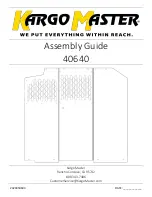
Vehicles with a higher center of gravity such as utility and
four-wheel drive vehicles handle differently than vehicles with a
lower center of gravity. Utility and four-wheel drive vehicles are
not
designed for cornering at speeds as high as passenger cars any more
than low-slung sports cars are designed to perform satisfactorily under
off-road conditions. Avoid sharp turns, excessive speed and abrupt
maneuvers in these vehicles. Failure to drive cautiously could result in
an increased risk of loss of vehicle control, vehicle rollover, personal
injury and death.
Loaded vehicles, with a higher center of gravity, may handle
differently than unloaded vehicles. Extra precautions, such as
slower speeds and increased stopping distance, should be taken when
driving a heavily loaded vehicle.
Your vehicle has the capability to haul more cargo and people than most
passenger cars. Depending upon the type and placement of the load,
hauling people and cargo may raise the center of gravity of the vehicle.
Use extra caution while becoming familiar with your vehicle. Know the
capabilities and limitations of both you as a driver and your vehicle.
ROLL STABILITY CONTROL STABILITY ENHANCEMENT SYSTEM
(IF EQUIPPED)
The Roll Stability Control system provides a stability enhancement
feature as well as a traction enhancement feature. It helps your vehicle
maintain traction, when driving on slippery and/or hilly road surfaces, by
detecting and controlling wheel spin. Excessive wheel spin is controlled
by momentarily reducing engine power and rapidly applying the anti-lock
brakes. The system is a driver aid which makes your vehicle easier to
handle primarily on snow and ice-covered roads.
If your vehicle should become stuck in deep snow or mud, try switching
the Roll Stability Control system off by pressing the Roll Stability Control
button. This will allow your tires to “dig” for traction.
If the Roll Stability Control system is activated and deactivated
excessively in a short period of time, the brake portion of the system will
shut down to allow the brakes to cool down. A limited Roll Stability
Control function using only engine power reduction will still help control
the wheels from over-spinning. When the brakes have cooled down, the
system will again function normally. Anti-lock braking is not affected by
this condition and will function normally during the cool-down period.
2004 Navigator
(nav)
Owners Guide (post-2002-fmt)
USA English
(fus)
Driving
241
















































